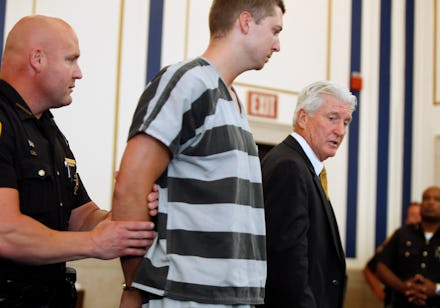Indicting Officer Ray Tensing Is Not Justice

There's winning the battle, and then there's winning the war. And few would argue that the indictment brought against former University of Cincinnati Police Officer Ray Tensing on Wednesday is a win of some kind.
What should have happened, happened: A police officer shot and killed an unarmed man, Samuel Dubose. The incident was captured on video. A prosecutor watched the video and — in no uncertain terms — deemed the officer a "murderer" and charged him with a crime. It was straightforward and brief, almost shockingly so.
This is what's supposed to happen when murderers kill others in the United States.
Yet the lead-up to Hamilton County Prosecutor Jon Deters' announcement had an undercurrent of dread running through it. Would black Cincinnati riot if the officer wasn't indicted? What if he wasn't charged? Speculation ran rampant, as UC campuses canceled classes and sent students home in preparation for the type of unrest that's set Ferguson, Missouri, and Baltimore ablaze in recent months.
Compared to this speculation, the outcry was almost nonexistent. There seemed to be the distinct feeling that — at least for now — justice had been served.
Which begs an important reminder: Justice has not been served. Accustomed though we've become to white police officers shooting, beating and otherwise brutalizing black Americans without consequence, the indictment of an officer for such a blatant crime is only one step in the right direction toward actual justice. But it remains a stark anomaly in the grand scheme of how often police are held accountable for the lives they take.
Statistics around this are kept inconsistently. However, FiveThirtyEight ran a pair of stories in the wake of Ferguson and Baltimore that showed police are rarely charged for crimes of any kind — and even more rarely convicted. From 2009 to 2010, fewer than half of officers accused of misconduct were charged. In the same period, only 33% of those charged for misconduct were actually convicted, and only 12% ended up incarcerated.
In comparison, the percentage of people convicted is doubled in the general population. The percentage of those who serve time is quadrupled.
Police officers' actions are more protected under the law than the rest of ours, and the process by which they are charged and prosecuted for crimes is often hindered by the prosecutors, who tend to work in close proximity with those very same officers and are overwhelmingly white and male. As black Americans are subjected to a disproportionate chunk of such misconduct, especially as it pertains to state violence and murder, they are among those who suffer the most.
Such anti-black violence is woven so intimately into the American social fabric that the mere suggestion of a police officer being punished for killing a black person is a huge deal. Maryland State's Attorney Marilyn Mosby was applauded when she charged six officers for killing Freddie Gray earlier this year. We dropped our jaws in shock when Michael T. Slager was charged with murder in North Charleston. Our bar is low. For so many years, it's had to be.
But if the protests that have engulfed the U.S. since last summer are any indication, people know that this is not the end of the war, and that the war will be a long one. The principles of white supremacy still dominate many facets of American life. And one indictment, even multiple indictments, are not the solution.
Even though it's important to recognize a victory when we encounter one, this victory is still qualified by the devastated families whose children, parents and siblings remain lost to them forever, and by the system that took them away and will continue taking away black lives at staggering rates until the whole of America wakes up.
Ray Tensing is going to trial. That is a victory, albeit a very rare one. But it is not justice. Not even close.